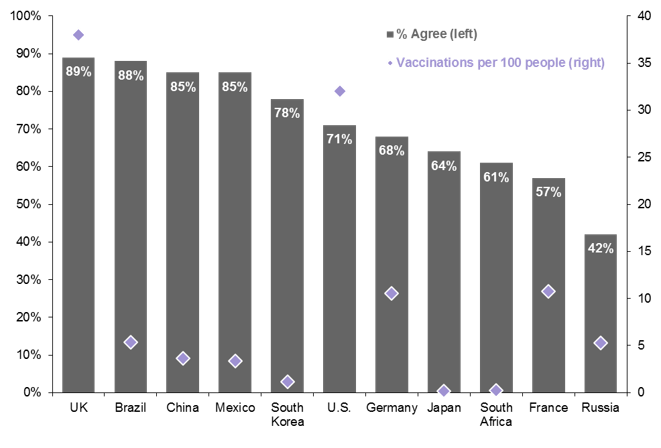Written by: Meera Pandit
"All regions will get there at some point, but how quickly we can do that will depend on reaching herd immunity, whether through vaccinations or exposure." - Meera Pandit
Despite many other measures to help slow the spread of COVID-19, there is only one that can end the pandemic: broad global vaccination. The world has already met multiple milestones in the vaccine journey—developing several safe and effective vaccines, establishing production supply chains, creating protocols to vaccinate, and even ramping up supply and speed. One obstacle still remains: ensuring everyone actually takes it.
Ipsos, in partnership with the World Economic Forum, surveyed respondents from 15 countries in late January about whether they’d get vaccinated. Broadly, there are four categories of acceptance. The first is those who are relatively enthusiastic about the vaccine, and have the supply to vaccinate, which include the UK and the U.S., which lead in global vaccinations. Then there are the enthusiastic countries like Brazil and Mexico, who just don’t have adequate supplies yet. The third category is countries like China, Japan, and South Korea, who vary on the spectrum of vaccine hesitancy, but due to low case counts, have little urgency. Finally, there are the vaccine skeptics like Russia and South Africa. This category increasingly includes parts of Europe, where some citizens and officials are skeptical about the side effects and efficacy of their available vaccines, slowing vaccination rates.
The challenge is that in order to end the pandemic, most people, and not just some people, need to be vaccinated. Herd immunity estimates suggest that at least 70% of the population needs to either be vaccinated or have some natural immunity to the virus from exposure, which means vaccination rates need to be pretty high. Not only that, but time is of the essence. Even in areas with low case counts, if the virus continues to spread, more harmful mutations can crop up and delay a full recovery.
Ultimately, ending the pandemic will lead to a durable economic recovery across the globe. All regions will get there at some point, but how quickly we can do that will depend on reaching herd immunity, whether through vaccinations or exposure. Broad vaccinations are likely to get us there faster and spare many lives and much uncertainty in the process.
Vaccine acceptance rates and vaccinations
"If a vaccine for COVID-19 were available to me, I would get it."

Source: Ipsos, Our World in Data, World Economic Forum, J.P. Morgan Asset Management. Global survey of adults under the age of 75, conducted on January 28-31, 2021. Total number of vaccination doses administered per 100 people in the total population. This is counted as a single dose, and may not equal the total number of people vaccinated, depending on the specific dose regime (e.g. people receive multiple doses). Data are as of March 14, 2021.
Related: What Kind of Equities Should Investors Own if Inflation Is Rising?

